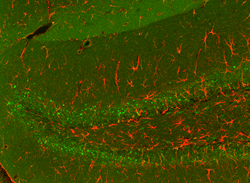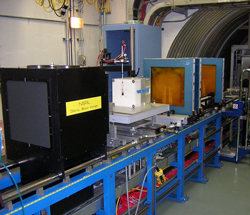Local CNS and Systemic Inflammatory Effects Following Space Radiation
Project Collaborator:

Astrocytes (red) in HZE irradiated hippocampus.
A major issue confronting future space explorers is the risk arising from exposure to radiation in the environment beyond Earth’s protective magnetosphere. The risks include chronic exposure to low level cosmic rays comprised of high energy particles (HZE) that cannot be effectively shielded against with current spacecraft technologies. Another risk comes from solar particles, comprised largely of protons that can be encountered at relatively high doses following solar flares. In addition to acute risks arising from exposure to solar flare protons and long-term cancer risks from chronic radiation exposure, there is significant interest in understanding whether space radiation will impair an astronaut’s ability to carry out long space missions (e.g. 3 years for Mars). Another possibility is that chronic space radiation may increase the risk for age-associated cognitive decline and neurodegenerative disease, such as Alzheimer’s.

Particle beam line at the NASA Space
Radiation Laboratory.
Our laboratories are engaged in a multi-year investigation funded by NASA that builds on previous funded work to address some of these questions in animal models of radiation exposure, with a long-term goal of helping NASA determine the level of CNS risks to astronauts. Importantly, we recognize that whole body radiation exposure affects other tissues and can result in systemic inflammatory response that in turn can affect the CNS. In particular, we are exploring the effects of protons and mixed particle radiation, at doses and fluences expected during space travel, in the brain and lung as well as the systemic circulation of mice. Dose and time dependent alteration in inflammatory indices will be correlated with brain and lung degenerative changes, including failure of hippocampal neurogenesis and alterations in hippocampal dependent learning. We will also explore whether space radiation influences Alzheimer’s disease pathogenesis using a unique transgenic mouse model and lung inflammation following challenge with inhaled lipopolysaccharide. Together these studies will address specific gaps in our current knowledge about the acute and late effects of space radiation on vulnerable tissues.

A Long Island Experimental Break.
All radiation exposures are carried out as part of a major team effort with 4 to 5 of us working at Brookhaven National Laboratories on Long Island with support from personnel in the NASA Space Radiation Laboratory (NSRL). Long-term studies are conducted on mice that have been shipped back to Rochester.